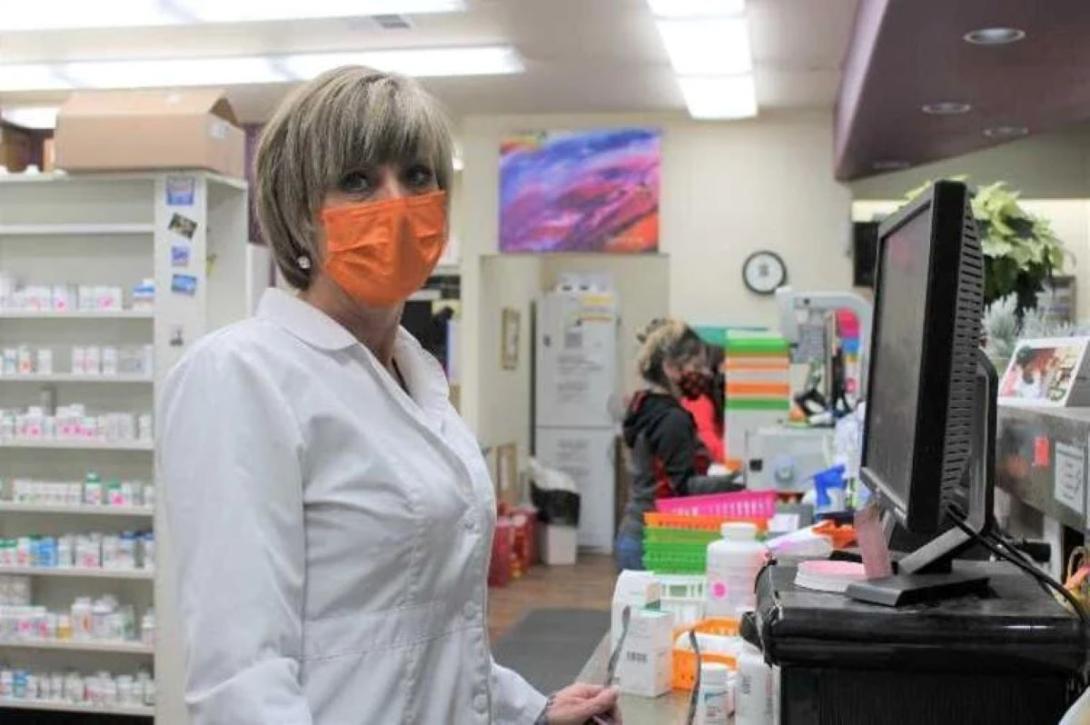
When the Madras Bi-Mart pharmacy closed, overnight an avalanche of prescription orders swamped the team at Hometown Drugs.
"I've stayed here until midnight," says store owner Jeanne Mendazona.
She arrives two hours before the store opens, stays after it closes, and works when it's closed on Sundays.
"No lunches. No breaks. I'm dead tired," she said.
Since the Bi-Mart pharmacy closed in November, the Hometown Drugs work load went from 1,600 prescriptions a week to 2,500 prescriptions a week. The Bi-Mart records aren't electronic yet. Instead, her team must pore through two three-ring binders 2-inches thick with patient document. "I need to hire more people, but I can't afford to, even with the influx of prescriptions." It bothers Mendazona that she can't provide the level of service she would like for her clients. "Before, I could fill most prescriptions in 15 minutes. Now clients have to wait hours."
Mendazona and her husband have owned the Madras Hometown Drugs for 25 years and they're determined to keep it open, but she says several factors are killing small town pharmacies.
Big guys squeeze out independent pharmacies
Bi-Mart closing and selling its accounts to Walgreens marks further consolidation of the retail pharmacy business. The big guys — CVS, Walgreens, Walmart, Cigna, UnitedHealth Group, Kroger, and Rite Aid — are squeezing out the independent pharmacies.
In a letter to the Federal Trade Commission, Sen. Ron Wyden (D-Oregon) noted seven national pharmacy chains account for 72% of revenues from dispensing prescriptions.
On the other hand, Wyden writes, from 2003 to 2018, more than 1,200 independent rural pharmacies closed. The changing structure of the pharmacy market squeezes the smaller pharmacies out of the game.
The big companies partner with the Pharmacy Benefits Managers who pay pharmacies when they dispense drugs. The PBMs control what they pay the pharmacies and independent pharmacies must pay fees to participate in preferred networks or for access to claims databases the large national retailers already have access to. These fees are part of the reason Bi-Mart sold its pharmacy business.
"The combination of Direct and Indirect Renumeration fees and the (Oregon) Corporation Activity Tax contributed to the reason that Bi-Mart was forced to exit the pharmacy business," said Don Leber, Bi-Mart vice president of marketing, "to ensure we could maintain operating our 80 Bi-Mart stores."
Fees grow exponentially for independent stores.
The DIR fees Leber mentioned grew 91,500% from 2010 to 2019. The fees didn't just double, triple or quadruple, they grew exponentially.
"At first the fees were insignificant," says Mendazona. "Now were paying $200,000 a year."
Add to that the CAT Oregon passed in 2019. So far, the CAT has raised $1.36 billion for the Student Success Fund. Most corporations pass the cost of the tax on to the consumer, but pharmacies can't. PBMs reimburse pharmacies based on the medications they dispense. Period. The tax comes out of the till for Hometown Pharmacy.
"People see how expensive the drugs are and they think we're making a lot of money," says Mendazona. "If people saw my bottom line, they'd be shocked." She adds that she personally has not taken a salary from the company in two years.
Worker shortage
Even if she could afford to hire people, "Pharmacists are expensive," Mendazona says, and she can't find people to hire.
Safeway struggles with the same problem.
"The nation is currently facing a technician shortage and, undoubtedly, all pharmacies have been impacted," says Safeway spokesperson Jill McGinnis. "We hope our customers will continue to be patient with us as we strive to fill open job positions."
More than counting pills
"People think we're just counting pills," says Mendazona, "but we're making sure the pills aren't killing you."
The counseling and recordkeeping are sometimes more important than the medicine pharmacists dispense, she says.
"That's something you don't get with a mail-order pharmacy." Mendazona worries about her clients who don't hear well or don't have smart phones and will miss the personal services independent pharmacies provide.
